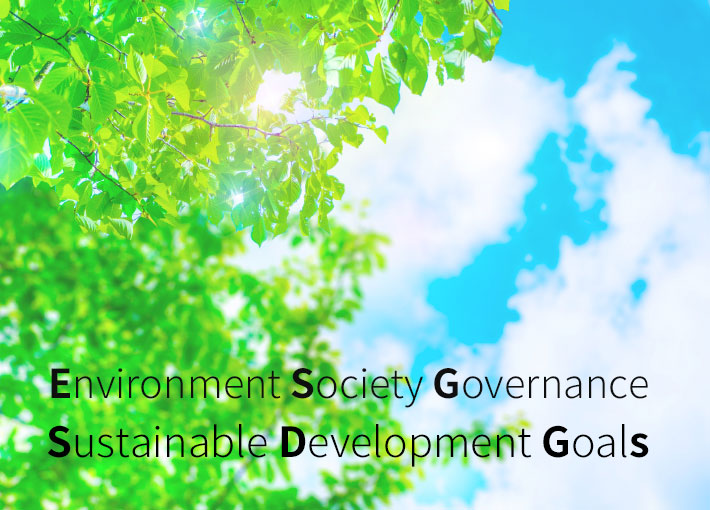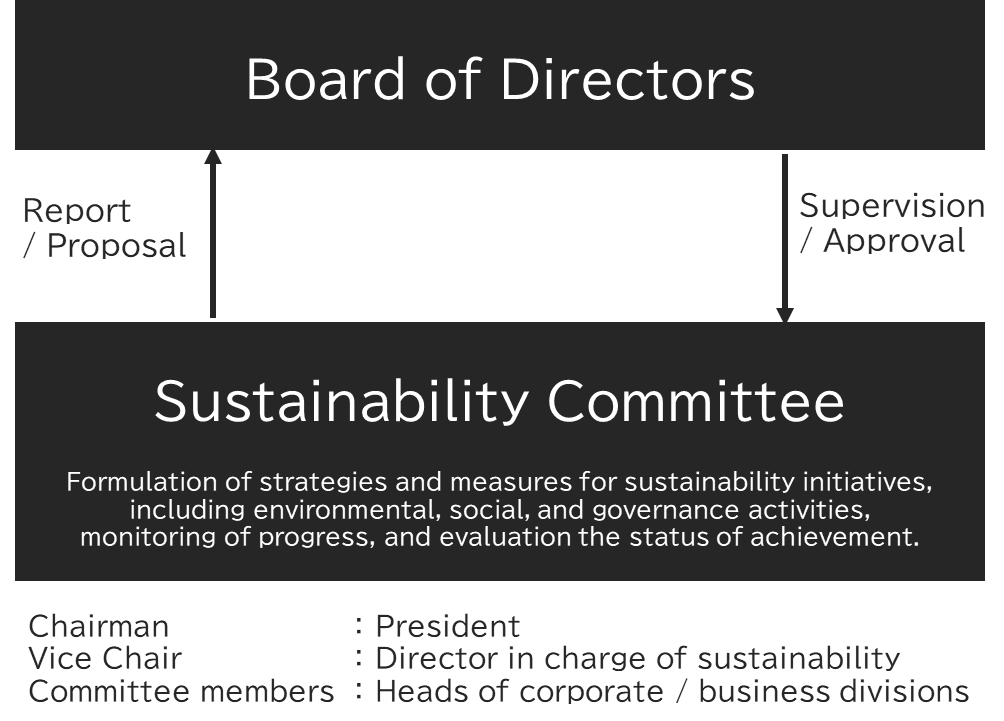

Sustainability
Climate Change Initiatives
Basic Approach
With the impact of climate change on lifestyles and businesses, such as natural disasters and extreme weather events, becoming a global issue in recent years, the use of renewable energy, etc., has come under scrutiny as part of efforts to achieve a decarbonized society.
We provide ICT systems and solutions to social infrastructure-related companies such as major electric power and gas companies that are promoting energy system reforms, as well as to the manufacturing companies that supports Japan's monozukuri (manufacturing).
Toward the realization of a sustainable society, we see climate change as one of the challenges facing society, and through the provision of ICT systems and solutions, we are committed to co-creating value with our stakeholders and promoting environmental management.
In addition, based on the scenario analysis recommended by the Task Force on Climate-related Financial Disclosures (TCFD), we intend to be proactive in understanding the financial impact of the "risks" and "opportunities" associated with climate change, and in developing business strategies and risk management, as well as in disclosing these risks and opportunities.
Addressing the Recommendations of the TCFD
The TCFD requires disclosure regarding the following four items in order for investors to accurately understand the risks and opportunities of climate change and make appropriate investment decisions.
●Disclosure content in line with TCFD recommendations
| Theme | Outline | Our Disclosure Pages |
|---|---|---|
| Governance | The organization's governance around climate-related risks and opportunities. | |
| Strategies | The actual and potential impacts of climate-related risks and opportunities on the organization's businesses, strategy, and financial planning where such information is material. | |
| Risk Management | How the organization identifies, assesses, and manages climate related risks. | |
| Metrics and Targets | The metrics and targets used to assess and manage relevant climate-related risks and opportunities where such information is material. |
●Governance
In order to promote group-wide sustainability activities, the Ad-Sol Nissin Group has established a sustainability governance structure centered on the Sustainability Committee, which is chaired by the President, and is working to address issues surrounding sustainability under this structure.
The Sustainability Committee identifies risks and opportunities related to climate change and promotes measures to address them. The Board of Directors receives regular reports from the Sustainability Committee on risks and opportunities related to climate change and the progress of response measures, supervises the progress toward targets, and directs actions as appropriate.
In addition, the Environmental Committee, a company-wide organization, formulates environmental policies and targets every year in light of changes in the external environment, and the Board of Directors makes decisions after deliberations by the Management Conference, whose members include directors and general managers. We have a system in place to regularly report to management on the status of our initiatives.

●Strategies
To address the impact of climate change on our business, we have identified risks and opportunities with particularly large financial impacts on all our businesses, including those upstream and downstream in the value chain, based on scenarios published by external organizations such as the International Energy Agency (IEA) and the Intergovernmental Panel on Climate Change (IPCC). The scenarios referenced are as follows.
| 1.5℃ scenario | IPCC RCP 1.9 IEA Net Zero Emissions by 2050 Scenario(NZE) |
| 4℃ scenario | IPCC RCP8.5 IEA Stated Policies Scenario(STEPS) |
Risks
| Scenario | Category | Major Risks | Time Span | Main Initiatives | |
|---|---|---|---|---|---|
| 1.5℃ | Transition Risks Reputation |
Loss of reputation due to delayed climate change-related responses |
|
Short to medium term |
As one of the management enhancement strategies in our medium-term management plan, we have stated our commitment to sustainability and are working to enhance our ESG information disclosure, including climate change issues. We will continue to enhance information disclosure by publishing a sustainability data book, posting sustainability information on our corporate website, and responding to various sustainability surveys. |
| 1.5℃ | Transition Risks Policy and Legal |
Introduction of carbon pricing |
|
Medium to long term |
We are promoting decarbonization through carbon emission reductions by energy conservation, the introduction of renewable energy, and the transition to low-carbon products such as LED lighting. We will continue to advance our efforts towards decarbonization and aim to reduce business costs in the medium to long term. |
| 1.5℃ | Transition Risks Policy and Legal |
Stricter GHG emissions reporting and reduction obligations |
|
Medium to long term |
We are currently calculating and disclosing our total GHG emissions (Scope 1 and 2). Our ongoing efforts aim to reduce these emissions, and we are exploring the possibility of obtaining third-party verification and establishing and disclosing reduction targets. |
| 1.5℃ | Transition Risks Market |
Increase in renewable energy procurement |
|
Medium term | We will continue to promote energy conservation while exploring methods for procuring renewable energy. Our aim is to reduce the risks associated with renewable energy procurement and lower costs in the medium to long term by diversifying our procurement methods. |
| 1.5℃ | Transition Risks Market |
Transition to technologies and services that enable decarbonization |
|
Medium term | As part of our medium-term management plan, we have identified "next-generation energy" as one of our growth businesses. In addition to our offerings for energy companies, we have begun providing specific decarbonization services to large energy consumers. To advance this initiative, we will establish a dedicated organization focused on understanding customer needs through active engagement and tailored solutions. We will also enhance our systems, technology, and partnerships to deliver services that effectively respond to societal changes and evolving customer demands. |
| 4.0℃ | Physical Risks Acute |
Increased risk of disasters due to extreme weather |
|
Short to medium term |
We recognize the risk of business continuity disruption due to natural disasters as a critical concern and are committed to maintaining and strengthening our crisis management system by continuously reviewing and updating our Emergency Business Continuity Plan. To prepare for potential transportation disruptions, we promote flexible work arrangements that are not tied to specific locations. Additionally, when selecting partner companies, we aim to diversify risks by avoiding reliance on specific firms or regions. |
| 4.0℃ | Physical Risks Chronic |
Increase in air conditioning load due to an increase in extremely heat days related to rising temperatures |
|
Short to medium term |
We are promoting carbon emission reductions through the introduction of energy-saving equipment and efficient operation of facilities in use. |
Opportunities
| Scenario | Category | Main Opportunities | Time Span | Main Initiatives | |
|---|---|---|---|---|---|
| 1.5℃ | Products/Services | Increased need for next-generation systems in energy companies |
|
Short to medium term |
In our medium-term management plan "New Canvas 2026," we have formulated a framework for the medium-term business strategy. The outline is as follows: → New Canvas 2026 ■ Base load Enterprise DX/Modernization
■ Growing businesses (1) Next-generation Energy
■ Growing businesses (2) Smart Infrastructure/Life
→ City Planning, Resilience ・ Smart Mobility → Mobility (automobiles, railways etc.,), Logistics ・ Smart Energy → Environment/Energy As part of the management sophistication strategies outlined in our medium-term management plan, we are dedicated to enhancing sustainability and improving ESG information disclosure. This includes addressing climate change issues. We will continue to strengthen our information disclosure efforts by publishing sustainability data books, posting sustainability information on our corporate website, and responding to various sustainability surveys. |
| 1.5℃ | Products/Services | Expansion of opportunities to provide consumers with energy conservation solutions. |
|
Short to medium term |
|
| 1.5℃ | Products/Services | ncrease in need for resilient cloud services. |
|
Short to medium term |
|
| 1.5℃ | Products/Service | Growing demand for smart cities and smart infrastructure / life to enable green transformation |
|
Medium term | |
| 4℃ | Products/Service | Expanding demand for solutions that contribute to countermeasures against natural disasters. |
|
Medium to long term |
|
| 4℃ | Products/Service | Increase in the need for energy-efficient air conditioning equipment due to rising temperatures. |
|
Medium to long term |
|
●Risk Management
The Group's Sustainability Committee identifies climate-related risks and discusses and determines countermeasures by taking into account the external environment, initiative status, and information from service provision departments and other relevant factors. The identified risks and the progress of countermeasures are reported to the Board of Directors as appropriate.
The identified climate-related risks are integrated into the overall risk management structure by incorporating them into the risk management process at the Risk Compliance Meeting, which manages risks for the Group.
●Metrics and Targets
We use greenhouse gas emissions and financial impact as metrics for evaluating climate-related risks. For evaluating climate-related opportunities, we use market scale, sales and other factors as reference values to assess opportunities.
We will continue to consider the targets to be used for managing climate-related risks and opportunities.
The following is a chart of GHG emissions in our group.
| Unit | FY'21/3 | FY'22/3 | FY'23/3 | FY'24/3 | FY'25/3 | |
|---|---|---|---|---|---|---|
| Scope1 | t-CO2e | 1.3 | 1.0 | 1.4 | 1.4 | 1.1 |
| Scope2 Market based |
t-CO2e | 448.4 | 502.0 | 407.5 | 398.3 | 519.7 |
| Scope2 Location based |
t-CO2e | 478.4 | 508.8 | 473.5 | 442.4 | 516.7 |
| Scope1+2 Market based |
t-CO2e | 449.7 | 503.0 | 468.9 | 399.7 | 520.8 |
| Emission intensity(Scope1+2 /net sales) Scope2: Market based |
t-CO2e/¥ million | 0.033 | 0.041 | 0.037 | 0.028 | 0.034 |
■Calculation period
All fiscal years: From April 1 to the end of the following March
■Scope of calculation
Offices, Subsidiaries and data center as of the end of March
FY'21/3:Tokyo Head Office, Kansai Branch, Kyushu Branch, Sendai Development Center, Ad-Sol Asia Corporation, Data Center
FY'22/3:Tokyo Head Office, Kansai Branch, Kyushu Branch, Sendai Development Center, Ad-Sol Asia Corporation, Data Center
FY'23/3:Tokyo Head Office, Kansai Branch, Kyushu Branch, Nagoya Office, Sendai Development Center, Ad-Sol Asia Corporation, Data Center
FY'24/3:Tokyo Head Office, Kansai Branch, Kyushu Branch, Nagoya Office, Sendai Development Center, Ad-Sol Asia Corporation, Data Center
FY'25/3:Tokyo Head Office, Kansai Branch, Kyushu Branch, Nagoya Office, Sendai Development Center, Ad-Sol Asia Corporation, Data Center
※Adsol-Nissin San Jose R&D Center, Inc. is excluded from the scope of calculation because its GHG emissions are immaterial.
※TechZen Co., Ltd. and are excluded from the scope of calculation because they are not our consolidated companies in the financial reporting.
■Targeted activities
Greenhouse Gas (GHG) Emissions from Business Activities
Scope1: Use of city gas in offices
Scope2: Use of electricity and hot/cold water heaters in offices and data centers
■Calculation method
・GHG emissions (CO2 equivalent) are calculated by referring to the GHG Protocol.
・Emission Factors for Calculation
- List of Calculation Methods and Emission Factors for Greenhouse Gas Emissions in the Calculation, Reporting and Publication System
・The following is the other reference in the calculations.
-Manual for Calculating and Reporting Greenhouse Gas Emissions
